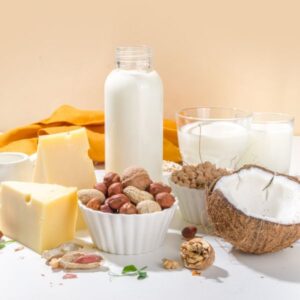 From preparing an omelet to making a toasted sandwich, cheese often brings a meal together. Yet those following a vegan or plant-based diet avoid this dairy product entirely but may seek out alternatives.
From preparing an omelet to making a toasted sandwich, cheese often brings a meal together. Yet those following a vegan or plant-based diet avoid this dairy product entirely but may seek out alternatives.
Initially, soy was the main ingredient in most vegan cheese products but now the selection has greatly diversified. The result delivers more nuanced textures, flavors and, in some cases, a small amount of meltability. Learn more about the options currently available for vegan cheese.
What Is Vegan Cheese?
On a general level, vegan cheese starts with a plant-based ingredient like soy, cashews, peas, coconut or almonds. The product begins as a non-dairy milk, although nutritional yeast can make a reliable parmesan substitute. A plant-based fat or flour may also be used for more meltability, such as rice, potatoes, tapioca or a nut oil.
Soy-based products replicated the look and texture of a block of cheese but the result didn’t melt and often fell short on flavor. Today, the process tends to be more complex: Bacteria may be added to the plant-based milk or oil and a thickener for the desired texture.
Common Ingredients for Vegan Cheese
The diverse options today often start with one of the following:
- Soy: Vegan cheese brands still use soy and may add an oil or thickener to improve its texture. However, some products may contain casein – a milk protein added to traditional cheese. This ingredient makes some soy cheeses plant based but not entirely vegan.
- Nuts and Seeds: Cashews, coconut and almonds are the most common, although some products may start with sunflower seeds, pine nuts or macadamia nuts. These solutions require less processing than soy-based cheeses, are first fermented with bacteria before yeast, then salted for flavor.
- Coconut: Coconut-based cheese starts with a high-fat milk or cream that’s combined with various flours, like tapioca or cornstarch, to improve softness and meltability. Ingredients with more savory or umami qualities, like garlic, salt or nutritional yeast, may also be included to enhance the flavor.
- Starch and Flour: Softer vegan cheeses may start with tapioca, potato flour or arrowroot, all of which take on a sauce-like consistency once heated.
- Aquafaba: The liquid left over from chickpeas is growing in popularity due to its meltability once turned into a cheese product.
Popular Types of Vegan Cheese
Based upon these ingredients, vegan cheese easily replicates:
- Cheddar, often starting with a nut base and incorporating a mix of nutritional yeast, apple cider vinegar, turmeric and spices.
- Parmesan, either through nutritional yeast or a cashew-based product.
- Mozzarella, which starts with either coconut oil or cashews.
- Cream cheese, which may start with a nut or coconut cream base.
- Soft and crumbly cheeses, like brie and blue cheese, also start with a coconut or other nut base before adding the necessary bacteria cultures for flavor and consistency.
Explore the possibilities of vegan cheese on our vegan menu. Browse our vegan offerings today!






